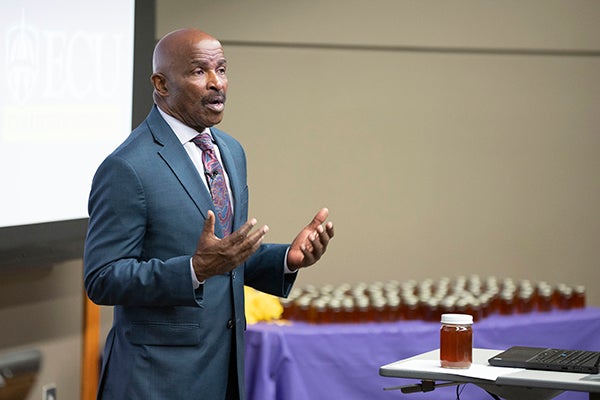College of Nursing speaker addresses inequities among Black farmers
The ECU College of Nursing celebrated Black History Month with a discussion on the legacy and future of Black farmers in local communities. Keynote speaker Rev. Richard Joyner presented “Black Farmers: Planting Seeds of Opportunity” during the Feb. 24 event that was offered virtually and in person to students, faculty and staff.
Joyner grew up as the son of a farmer, watching the fruits — and profits — of his father’s hard labor being taken by others. Years later, following the deaths of too many beloved community members due to preventable health issues, Joyner returned to his roots and the fields to provide the nutrition, health and education his community desperately needed.

Rev. Richard Joyner, founder of the Conetoe Family Life Center, discusses the history and legacy of Black farmers and how they provide education to younger generations with member of the ECU College of Nursing.
Joyner, named a CNN Hero in 2015 for his work planting a garden and engaging the community in the process of building sustainable pathways toward better nutrition and health in Conetoe, N.C., discussed the history and legacy of Black farmers and how they provide education to younger generations.
College of Nursing leaders said the event’s focus on health disparities brought attention to racial inequities that impact every part of life for many people.
“Health inequalities influence the health and well-being of people and are often due to social and economic inequities that are rooted in racism,” said Dr. Sylvia Brown, dean of the College of Nursing. “Because of their effect on health outcomes, it is essential that nurses have an understanding of health inequalities and their causes, so that they can adequately address the challenges and serve as advocates for patients. Programs such as this create educational opportunities for our faculty, staff and students to learn about ways to improve access and erase inequities.”
Joyner has also been the keynote speaker for the Jean Mills Health Symposium in 2019, and when he toured the Brody School of Medicine with other pastors in 2013.
According to “Black Farmers in America” in 1920, Black Americans made up 14% of all the farmers in the nation and worked 16 million acres of land, but by 2003, they accounted for less than 1% of the nation’s farmers and cultivated less than .003% of the farmland.
Wendy C. Bridgers, clinical assistant professor in the College of Nursing, said that since the post-Civil War era, African American farmers have faced systemic social and economic barriers that limit their ability to own and operate independent farming businesses.
“Access to health care is problematic for many farmers, and African Americans in eastern North Carolina are disproportionately affected by health disparities and health care inequity,” Bridgers said. “We felt it was important to educate our nursing students and faculty about Black farmers who have thriving businesses in Eastern North Carolina, and to highlight what these farmers are doing to promote health and well-being in their communities.”
Clinical Associate Professor Sharon Mallette said that each semester, Community Health Nursing students complete community service-learning engagement projects.
“Typically, the students complete a community survey to identify health priorities and work with community partners to address the health priority with skills such as screenings, health teaching, advocacy, collaboration and/or coalition building,” Mallette said. “We are very excited for the possible future collaboration with Rev. Joyner and other community partners at the Conetoe Family Life Center in response to his invitation to team up. We anticipate that this relationship will expand health support for his farm program, Food is Medicine.”
Related
REDE Relentlessly Rural Podcast: Conetoe Family Life Center